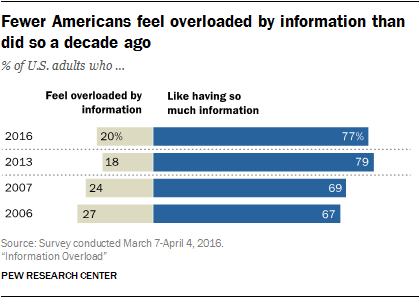 Blog Roundup
Blog Roundup
This week’s reads: Adapting to info overload, minor-league marketing,…
We talk a lot about being overwhelmed and bombarded by messages in the digital age – and by “we,” I mean “marketers.”
However, according to a Pew Research study on information overload, the rest of the world may be getting along just fine!
- 81% of adults say this statement describes them “very well” (61%) or “somewhat well” (20%): “I feel confident in my ability to use the internet and other communications devices to keep up with information demands in my life.”
- 80% say this statement describes them “very well” (41%) or “somewhat well” (40%): “Most of the time, it is easy for me to determine what information is trustworthy.”
- 79% say this statement describes them “very well” (44%) or “somewhat well” (35%): “Having a lot of information makes me feel like I have more control over things in my life.”
Not surprisingly, those defined as having “access abundancy” (home broadband, smartphone and tablet) have the easiest time managing information. Of course, that begs the question: are they more comfortable managing all that information because they have access across multiple devices in multiple locations? Or do they access multiple devices in multiple locations because they’re more comfortable managing information?
Regardless, people are figuring out how to find what they need, when they need it, and they appear comfortable that they can go to a small number of resources (i.e. the first page of the Google SERP) and not worry about the 8,000 or so additional hits their query received.
The study suggests that there’s a correlation between the times we feel overloaded and specific situations, “such as when institutions impose high information demands on people for transactions, which create a sense of information burden for some Americans.” Which explains why my hands start to shake when I get within 100 yards of the Department of Motor Vehicles.
The takeaway for marketers: How easy do I make it for my customers and prospects to collect, reference and recall information they may need to interact with my brand? Do they feel like they have to “do their homework” before coming to me with an issue? And do I know how my prospects and customers are managing their informational needs?
Changing the way we write for a mobile audience
I have to confess, one of the main reasons I don’t use my smart phone as much as I could is because so many sites still aren’t that easy to read on it. I’m old enough to still be locked into using my desktop, but more and more, sites need to be set up where it’s easy to scroll down, easily notice main points in an article, and potentially offer opportunities to download or save links to more complex or detailed materials.
In many ways, it’s going to require a completely different set of writing skills. TopRank Marketing does a good job of outlining some thoughts to keep in mind as you make the move to mobile-friendly content.
So maybe scrolling sites are the way to go!
If mobile users like to scroll and they want easy-to-read content that doesn’t include a lot of popups or clicks, then maybe it’s time to revisit the idea of finding a niche that you can own, creating the definitive work on the subject, and putting the whole thing on one really long scrolling web page.
So writes Doug Kessler at Velocity:
But there’s a format that’s been neglected for far too long — and it’s sitting right under our B2B noses: the web page.
Not just any web page; a specific kind of web page we call “The Long-Ass Web Page”.
What is a long-ass web page?
A long-ass web page is a web page that has these characteristics:
- It’s really, really long – a workout for your scroll-finger
- It’s broken into chapters – often with some kind of jump-down navigation
- It’s multimedia – combining text, illustrations, animations, video, interactive bits…
- It’s about one discrete topic – small enough to ‘own’, big enough to matter
- It’s search-optimised – with the topic (and usually the title) as its keyphrase
- It’s responsive – because mobile
Why marketing is more fun in minor league baseball
Courtney Eckerle at MarketingSherpa did a piece last month on the name-change of the now-Jumbo Shrimp of Jacksonville. I don’t know whether I like the name or not, but I can say that I wouldn’t have read — let alone linked to — an article about an obscure minor-league baseball team changing its name to the Jacksonville Suns.
Not everyone has the luxury of going that far out on a limb in rebranding their company. Sometimes the minor leagues are the best leagues… But there are plenty of good marketing takeaways from the team’s efforts for anyone who wants to swing for the proverbial fences!
Viral may be great, but not for SEO ranking
It’s probably always good to have a goal in mind for any attempts at going viral with a marketing piece. Tomas Vaitulevicius at Moz makes a good case that boosting your domain authority may not be a reasonable outcome.
Ultimately that’s probably a good thing, assuming it’s true that viral hits don’t necessarily pass on authority through increased linkbacks and shares. A cat swinging from a trapeze while singing the aria from Madame Butterfly is probably very entertaining, but unless your products are singing cats, circus acts, or opera performances, it’s a good bet that the correlation between your content and the main focus of your website is pretty weak.
Because everyone loves lists…
Two weeks in a row. This could become a thing!
12-point B2B Positioning Health Check
11 Examples of Facebook Ads That Actually Work (This one gets bonus points because it has multiple lists WITHIN the list: 4 components of successful ads, 3 primary formats, and then 8 specific types of ads. Somehow or another, the actual number of ads mentioned in the blog equals 11 (hence the blog title), but the URL slug says “10.” But who’s counting? I’m teasing, Hubspot. I love you guys.)
10 Ways Content Marketing and Sales Teams Can Work Together
9 Clever Ways To Create Live Video on Social Media
8 Steps To Become a Marketing Guru
7 Laws of Sales Funnel Physics Every SaaS Business Needs to Know
6 Easy Ways To Research and Develop Buyer Personas
5 Ways To Use Periscope To Connect With Customers
4 Ways To Make Sure Your Mobile Content Connects
3 Lesser-known Copywriting Techniques That Keep Readers Glued To Your Content
Follow This 1 New Trend and You Will Be Found Online
And the funniest thing that happen to me this week:
Sometimes the Internet supplies its own fun. OK it always does, but sometimes it’s less intentional than others…
I was reading an article that referenced Google’s intention to penalize sites for using pop-up ads starting in 2017. And when I clicked the hyperlink to access the source story, I got this wonderful blast of irony:

January can’t get here soon enough!


